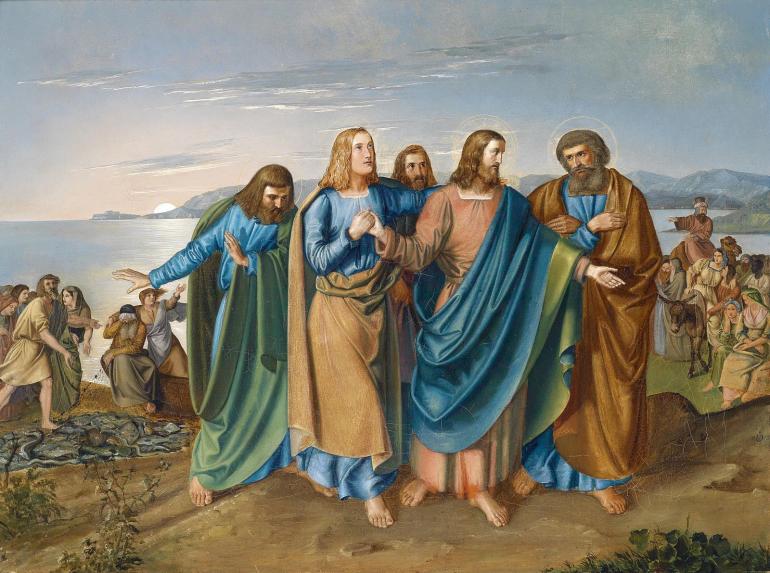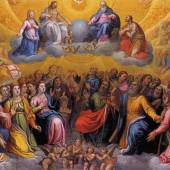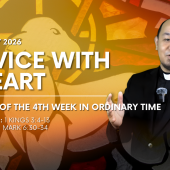Do you also wish to go away?

Sunday, 21st Week in Ordinary Time
Daily Readings: Joshua 24:1-2,15-18; Ephesians 5:21-32 & John 6:60-69
Reflection Date: August 22, 2021
Today's gospel passage (John 6: 60 – 69) is all about taking a stand for or against Jesus, following Jesus, or rejecting Jesus. The drama of faith announced by John in the Gospel, namely, the non-acceptance of Jesus by His own and acceptance of Him by others, is realized already in Capernaum. Many of His disciples leave Jesus. But the Twelve continue to believe in Jesus. Peter's answer could be paraphrased equivalently as, "Lord, what they have heard, we heard. If they did not understand, neither do we understand, but we accept what you said, Lord, because it is you who said it."
To believe is to accept Jesus' words on Jesus' saying so and not because we are able to understand and explain them satisfactorily. "I believe so that I may understand," says St. Anselm's adage. If we believe, we will understand. Indeed, when we receive Jesus in the Eucharist with faith, we will experience that it is the Lord and no less than He whom we are receiving.
Joshua's message in the First Reading (Joshua 24: 1 – 2a. 15 – 17. 18b) echoes that we cannot serve two gods. Jesus said the same thing. "No one can serve two masters; for (you/the slave) will either hate the one and love the other or be devoted to the one and despise the other. You cannot serve God and wealth (Matthew 6:24)." Their gods were idols (Genesis 35:4), objects of precious metals.
Today, we can compare those gods to the many worldly possession that people place over and above the one and only true God. How many souls dedicate more time towards praising their personal property than they do towards their personal relationship with God? How many places more value in their car, their house, their cottage, their money, their jewelry, their spoon or unicorn collections, their stereo system, forgetting that all these goods were provided by the Lord God for their comfort?
The passage ends with a note by telling us that the people were prepared to make a firm commitment in serving the Lord, "for He is their God (Joshua 14: 18)." He is the Lord God who brought their ancestors up from the land of Egypt, out of the house of slavery, and who did great signs in their sight. He is the Lord God who protected them all the way they went and among the people through whom they passed (Joshua 14: 17 - 8)."
For those of us who do not wish to go away, choosing to serve the Lord God, what must we do? St. Paul answers that question in today's reading from the Letter to the Ephesians (Ephesians. 5: 21 – 32). We are to be kind to one another, tenderhearted, forgiving one another, as God in Christ has forgiven us (Ephesians. 4: 32).
We are called to be imitators of God, as beloved children (Eph. 5:1)." As Jesus came to serve, we are called to serve one another. Jesus said, "Whoever serves me must follow me, and where I am, there will my servant be also. Whoever serves me, the Father will honor (John. 12: 26)." How do we serve the Lord Jesus? Jesus answers that question. "For I was hungry and you gave me food. I was thirsty, and you gave me something to drink. I was a stranger and you welcomed me. I was naked and you gave me clothing. I was sick and you took care of me. I was in prison and you visited me (Matthew 25: 35 - 36)."
Love is also manifested in the marital relationship. Wives are to be subject to their husbands (Ephesians. 5: 22) and husbands are to love their wives (Ephesians. 5: 25) just as Christ loved the Church and gave himself up for her. As the Church is subject to Christ, the husband is subject to the Church. All these truths have been revealed to us by the inspiration of the Holy Spirit in the writing of the Holy Bible.
While everyone is subject to someone of higher authority, this does not give the authority to the Church to abuse its power, nor to the husband to abuse his power. In love, we are to grow in holiness as brothers and sisters in Christ. We are to grow in holiness so the husband can present his wife to God in a beauty that is equal to the splendor in which Christ will present the Church to the heavenly Father, without a spot or wrinkle or anything of the kind (Ephesians 5: 27)."
We are all members of the Body of Christ (Ephesians. 5: 30)." As such, our membership requires that we tend to those under our authority in the same way as we take care of our bodies. No one hates his body. He nourishes it and tenderly cares for it, just as Christ does for the Church. The Pope, as our spiritual Father, nourishes us with spiritual food, caring for us as Christ cared for us. The bishops nourish and care for their dioceses. The priests nourish and care for the sheep in their parishes. Husbands nourish and care for their wives, who in turn nourish and care for their children. And each one of the aforementioned does so by humbly serving the other.
This week, let us reflect upon our commitment towards the Lord Jesus. Let us dread just the thought of Jesus asking us, "Do you also wish to go away?"
Joseph Cardozo SJ | Contributor
Radio Veritas Asia (RVA), a media platform of the Catholic Church, aims to share Christ. RVA started in 1969 as a continental Catholic radio station to serve Asian countries in their respective local language, thus earning the tag “the Voice of Asian Christianity.” Responding to the emerging context, RVA embraced media platforms to connect with the global Asian audience via its 21 language websites and various social media platforms.














